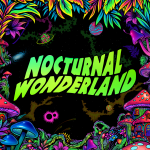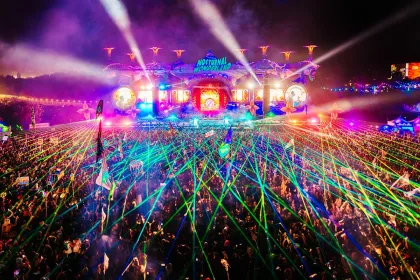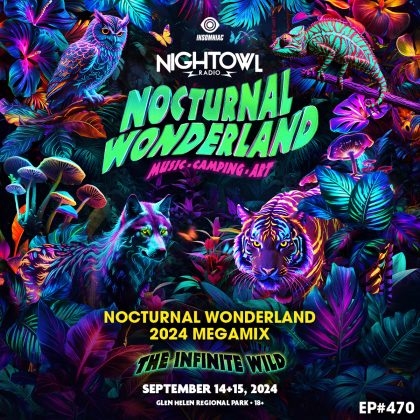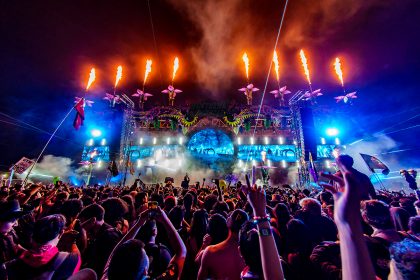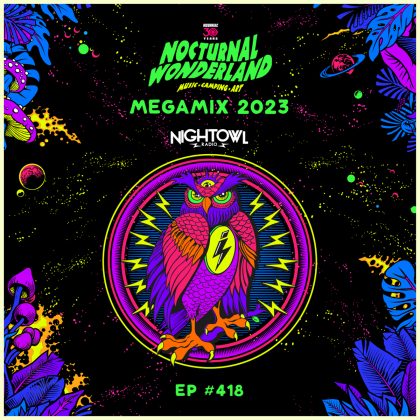Exclusive Sacha Robotti Tech-Funk Playlist Ahead of Nocturnal Wonderland 2017
Upcoming Event
Sacha Robotti grew up a German-Italian national in Brussels, Belgium—a natural conduit for amalgamated grooves and sonic whorls. First drawn to a Detroit-informed style of fast mixing with provocative bass, Robotti explored techno, electro and ghetto house before expanding his coterie of influences to include hard trance hymns, filter funk and deep house, among other styles.
Robotti left behind studies in architecture to launch his music career full-time in 2005, scoring his first Beatport hits “Worst Love” and “The Edge” as one-half of DJ-production duo Robosonic. But adjectives he’s used to describe the world’s compelling structures—such as alien, timeless, spiritual and unreal—still hold true for his planes of sound and their effect on the human ear and psyche. Sharing the stage (and sometimes studio) with artists such as Claude VonStroke, Mikey Lion, Kevin Knapp, Kill Frenzy and Justin Martin, Robotti is unafraid to pepper his bass-rich tracks, such as 2017’s “Melato Nina” and “Ol’ Dirty Hearts,” with cheeky wobbles and emotional resonance, as long as it triggers physical reaction.
“Every party and environment, as well as the set times, the lighting, the political situation, the crowd, the temperature, the mood that’s in the air can influence the music that I’m going to play!”
Carving out some in-flight time between bicoastal gigs, Robotti has shared a sinewy tech-funk playlist (see track list below) and an insightful Q&A in the lead-up to his appearance at Nocturnal Wonderland 2017—part of his fall “slothacid” tour, which is named for a spirit animal that, like Robotti, lives happily in the moment.
Please set up your playlist that you put together for us.
Since I started using a sloth logo for my parties in L.A. last year, this spirit animal has increasingly been associated with my artist persona. Sloths are an endangered species of friendly, chill creatures who sleep a lot and seem to live happily in this moment—qualities I can relate to, especially today in our performance-driven society.
The legend goes that magic sloth candy blew minds during my set at Desert Hearts Festival 2017. I now use the term “slothacid” to describe the style of electronic music that I like to play out at festivals and clubs: a mix of groovy, emotional, weird, psychedelic music with tough beats that hopefully will take you on a journey through space-time.
Do you remember the first time you heard electronic tones and thought they were musical rather than just functional?
I think some of the first electronic sounds I heard came from the Beatles, Pink Floyd, Kraftwerk, that kind of stuff; I wasn’t really identifying these sounds as “electronic,” though. Rave music, trance and techno on late-night radio in Brussels was what got me into going to clubs and raves, as well as starting to collect and play records!

What was the first electronic composition you purchased?
The Prodigy Experience in 1992. It blew my mind.
What are some of the most influential sets and performances you experienced young?
When I was 15 in Belgium in ‘95, I got obsessed with DJing and how these DJs mixed vinyl together, so I went deck-sharking a lot. It was mainly at two different clubs: Fuse in Brussels and Food/Silo in Leuven. Jeff Mills, Green Velvet, Dave Clarke, DJ Funk, Sven Väth, Blake Baxter are some of the artists, to name a few. There was also a funky community of local promoters and DJs doing parties in weird off-locations and warehouses—great fun. Often, you’d have different floors at parties, like techno + house, drum & bass, hip-hop all mixed up.
What impact did moving to Berlin have on your musical development?
Berlin was where I started my DJ and producer career, then as the duo Robosonic [with partner Cord]. We did this for 12 years, played many shows in Berlin and in countries I wouldn’t have thought I’d ever have the chance to travel to. My solo project took shape in Berlin, too, seven years ago. The city, my friends, its clubs, its network, my studio, my life there—everything had an influence on my musical development.
You studied sound design and psychoacoustics in Berlin. Whom would you consider a mentor in the type of music you now produce and spin?
I’d consider Karl Bartos a mentor, someone who influenced my thinking about being an artist in the music world now. He was my professor at the Berlin University of Arts, and I feel privileged to have had an insight into his experiences as a solo performer and former member of Kraftwerk, be it while he was touring or composing electronic songs that are now considered pop classics!
Since moving to Los Angeles in 2016, you’ve concentrated on a solo style you’ve described as “groovy, emotional, weird, psychedelic music with tough beats.” Are there ways you feel your background in architecture and the motifs you program run parallel?
That’s a long shot, but you could argue that a track needs a foundation like a building, which could be the bass and kicks. Walls can be decorated or bold or with patterns, that could be like a beat or groove and percussion. Windows, doors and openings for ventilation could be dropouts or spaces between sounds. Colors could be melodies. Stairs to get up a few levels to the penthouse could be your break, sweep, rise and drop. Or something like that… LOL, you can take this anywhere. Although you know what they say: Writing about music is like dancing about architecture!
Inspired by your older sister’s studious approach to classical piano, you took up the cello and bass from ages 8–15. What effect do you feel that has had on your production?
When I listen to a track now, the first thing I focus on is what the bass does. Subconsciously, I start ghost-playing the bassline with my fingers as if I would play it on the cello. It’s pretty weird, and I can’t switch this off.
Is there a musical scale and/or key that most speaks to you?
I like minor scales and blue notes.
Is there a frequency range where you spend the most time sculpting form and texture?
I feel it’s often the trickiest thing to get the low-end of a track just right.
Do you feel low-end has a nationality and regionality?
My feeling is that hip-hop culture is very present in the States, since it was born and developed there, so I feel the emphasis on bass and its role was always stronger here than, let’s say, in Germany. France has been embracing hip-hop since the late ‘80s. Bass in the UK has always been one of the major driving forces in the way music is showcased to the crowds out there on massive sound systems—jungle, drum & bass, garage, dubstep, grime, to name a few, were all heavily influenced by the fabric of the UK population, by this cultural melting pot.
When you choose to collaborate on a track, what element do you feel you bring to the session?
I want to have a good time while producing when I make music with someone else, and I think one of my strengths might be arrangement!
Walk me through the construction of a track—from concept to completion.
I sometimes have an idea to begin with, sometimes a sample, sometimes a melody, and sometimes nothing at all! Mistakes can be the start of something fun and new. I started doing live production sessions on my Insta recently; follow me to check it out!
You’re now a part of the extended Dirtybird squad. Tell me your thoughts on contemporary label infrastructure, and what part streaming and social media play in success.
In a world where technology is shifting toward mobility and availability of music on every device and platform, I feel labels are becoming more like brands that stand for a certain sound, feeling and lifestyle; they act as tastemakers and hubs. These brands articulate themselves via their fan base with music streaming, music sales, a social media personality, and interaction with fans, merch, parties.
Does the environment of a party such as Nocturnal Wonderland change the type of set you play?
I would say that every party and environment—as well as the set times, the lighting, the political situation, the crowd, the temperature, the mood that’s in the air—can influence the music that I’m going to play! Also, my sets are mostly improvised.
Paint a picture of what you think your set feels like from the crowd.
I hope they enjoy themselves and get into the music, and I hope they feel comfortable to let go, be present in the moment, and join our collective journey through space-time!
What is the most compelling thing someone has said to you about your music and that keeps you motivated?
The words “I lost my shit” were mentioned a few times. Positive feedback for sure keeps me going!
You can catch Sacha Robotti doing his thing at Nocturnal Wonderland 2017, which takes place Friday, September 15, and Saturday, September 16, at Glen Helen Regional Park in San Bernardino, CA. Tickets are available now. For more information, visit the official website.
Sacha Robotti Facebook | Twitter | SoundCloud | Instagram


